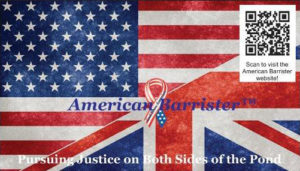The USPTO refused to register the mark AMERICAN BARRISTER for legal services, deeming the mark to be merely descriptive under Section 2(e)(1) and primarily geographically descriptive under Section 2(e)(2). Applicant Robert J. Olejar’s specimens of use indicated that he is both a British barrister and an American attorney at law. How do you think this came out? In re Robert J. Olejar, Serial No. 86302887 (August 11, 2016) [not precedential].

The Board first observed that refusals for mere descriptiveness and geographical descriptiveness should preferably be made in the alternative. The Board proceeded to analyze the two refusals as if made in the alternative.
Mere Descriptiveness: The definitions of record indicated that “barrister” is “a lawyer in England or Wales who is allowed to speak in the higher law courts.” The Board found no evidence that “barrister” has a descriptive meaning in association with legal services rendered in the United States.
Because there is no evidence that legal services are rendered by “barristers” in the United States, we find that the phrase AMERICAN BARRISTER, considered as a whole, presents an incongruity that renders the mark suggestive. At least some imagination, thought, or perception is required to deduce what service characteristics the term indicates: that Applicant is an American lawyer offering legal services in the United States who also is qualified as a barrister in Great Britain.
Geographic Descriptiveness: The Board noted that marks incorporating the term “American” present “a special challenge” under Section 2(e)(2). TMEP Section 1210.02(b)(iv) points out that there is no simple or mechanical rule in dealing with these marks: “The introduction of a nuance, even a subtle one, may remove a mark from the primarily geographically descriptive category.”
According to the Board:
If the term is used in a way that primarily denotes the United States as the origin of the goods or services, then it is primarily geographically descriptive. [E.g., MONOGRAMS AMERICA for embroidery stores.] *** Conversely, if a composite mark does not primarily convey geographically significance overall, or if AMERICA or AMERICAN is used in a nebulous or suggestive manner, then is not primarily geographically descriptive. [E.g., THE AMERICAN GIRL for shoes].
The Board concluded that the word AMERICAN in the applied-for mark will be perceived as primarily referring to a personal characteristic rather than geographical location. Considering the incongruity of the mark, the Board was not persuaded that consumers would made an association between the services and the place named.
And so the Board reversed both refusals.

